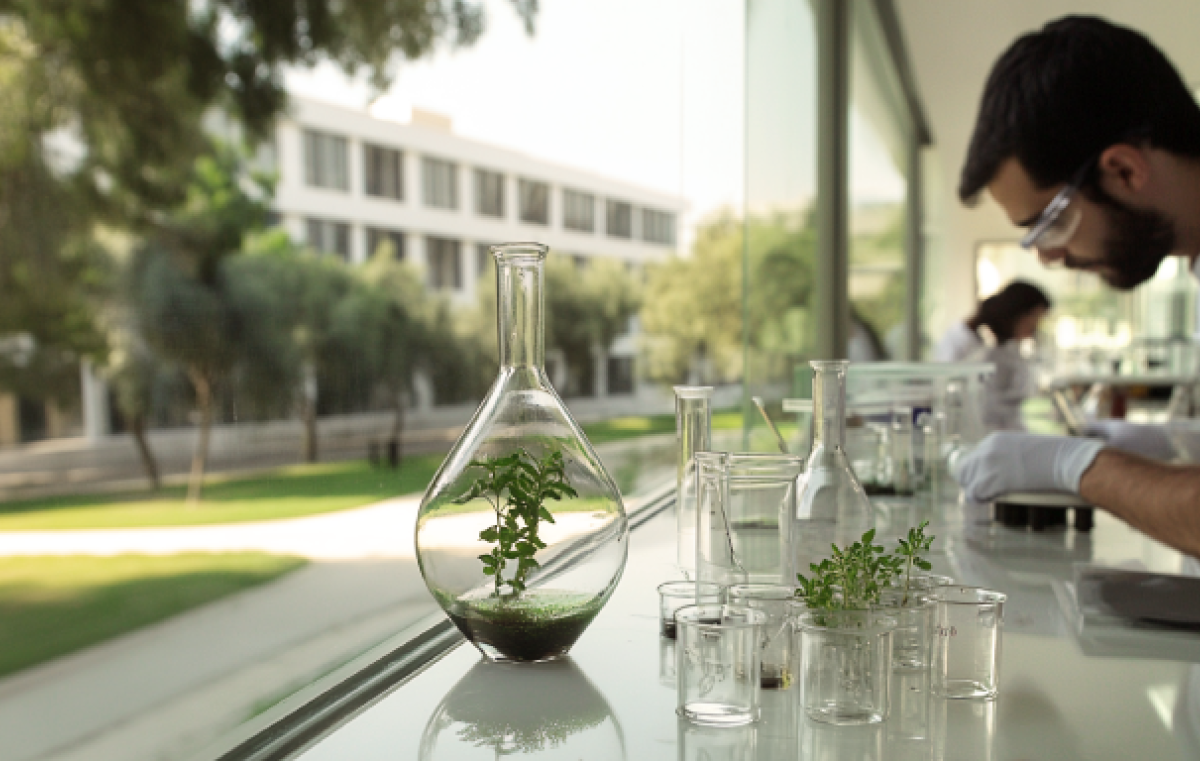Bar-Ilan’s Green Vision for the Future
From Algae-Based Fuel to Green Walls on Campus – A Look at the Research, Academic Programs, and Community Initiatives That Make BIU a Leader in Sustainability

Clean Energy Production and Storage
Did you know that fuel can be produced from algae? Dr. Yaron Yehoshua from the Faculty of Life Sciences at Bar-Ilan University is leading research on an efficient, cost-effective, and sustainable alternative to fossil fuels. The search for natural and environmentally friendly energy sources, aimed at reducing air pollution, minimizing climate change damage, and improving environmental conditions, is the focus of more than 50 research groups at the university, including some of the world’s leading experts in energy.
Prof. Lior Elbaz specializes in hydrogen-based electricity generation through fuel cells, a technology that also enables energy storage. His development, from the Department of Chemistry, has the potential to revolutionize energy storage and production, significantly reducing reliance on polluting fuels. Meanwhile, in the Electrochemistry Laboratory led by Prof. Doron Aurbach, researchers are working on an advanced lithium battery for electric vehicles, a breakthrough that could impact the entire electric vehicle industry.
Bar-Ilan's green initiatives are already making a difference on campus. A cutting-edge robot developed by Prof. Gal Kaminka from the Department of Computer Science is improving the efficiency of solar panels by 20% by cleaning them more effectively.
Reducing Air Pollution and Advancing Agriculture
Rapid urbanization is leading to a decline in open green spaces, increased temperatures in bustling areas, and air pollution. To combat these challenges, Bar-Ilan’s Smart Cities Center, in collaboration with a university in China, is conducting an experiment to explore solutions. Led by Prof. Itamar Lensky, the project has introduced green walls on campus to examine their environmental impact.
In another project, Prof. Lensky harnessed technology for agricultural advancements by developing an application that helps farmers optimize sowing and harvesting times using satellite data.
Another research initiative focuses on the feasibility of growing crops alongside solar panels. Led by Prof. Yigal Cohen and Dr. Yariv Ben Naim, this study could provide a dual-use solution for land, addressing a global dilemma: should land be used for growing tomatoes or for generating solar energy?
Fighting Climate Change Through Regulation
Addressing climate change—manifested in wildfires, floods, extreme heat, and cold waves—requires more than just technological advancements; legal measures must also be in place. This is the specialty of Prof. Oren Perez, who heads the Faculty of Law’s Environmental Regulation Clinic. Prof. Perez also established Israel’s only master’s program in Environmental Regulation and Policy, in collaboration with Dr. Orit Rotem from the Department of Environment, Planning, and Sustainability. The program operates within the university’s School of Sustainability and the Environment, working closely with industry partners to train students in promoting environmental legislation. The program also includes a specialization in Corporate Responsibility (ESG).
The interdisciplinary School of Sustainability and the Environment prepares researchers to tackle climate phenomena such as rising sea levels, desertification, hurricanes, tsunamis, volcanic activity, floods, and droughts. The school offers a master’s program in Earth and Environmental Sciences and trains experts in energy and sustainability technologies within the Faculty of Engineering (Materials Engineering program) and the Faculty of Life Sciences (Environmental Biology master's program). To encourage research and study in these areas, the school awards scholarships to outstanding students and organizes an annual environmental event. In 2025, the event will be a hackathon focusing on waste disposal and recycling solutions.
Sustainability in Action on Campus
At Bar-Ilan, sustainability is both taught and practiced. The university’s School of Sustainability and the Environment initiated the formation of a "Green Community," comprising faculty members from various departments who promote environmental projects both on and off-campus. Their efforts include waste reduction, recycling, and promoting reusable products. Among their initiatives: a partnership with Elite Coffee, offering discounts to customers who bring reusable cups; the installation of collection stations for unused medications, in collaboration with the "Friends for Medicine" organization; and a second-hand fashion fair.
The Green Community's work complements existing eco-friendly solutions on campus, such as dedicated recycling bins for paper, plastic, electronic waste, and toner cartridges, as well as the use of environmentally friendly pest control methods. The campus also promotes sustainable transportation with electric shuttles and solar-powered street lighting.
All of this takes place on a spacious and well-maintained campus, filled with lush greenery, boulevards, walking paths, gardens, and eight "Story Gardens" inspired by Jewish traditions and scientific concepts. Thanks to these efforts, Bar-Ilan has been recognized by the Council for a Beautiful Israel for its environmental contributions. The award’s justification stated: “Bar-Ilan University’s campus is an oasis of tranquility and harmony.”
And indeed, it is. We invite you to come visit.